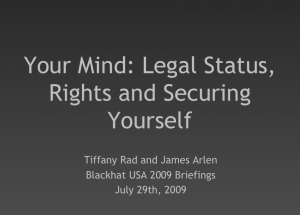It’s been an interesting couple of weeks for Tiffany Rad and I as we’ve watched the story around the US Department of Justice and encryption keys.
During the Summer of 2009, you may have seen our talk “Your Mind: Legal Status, Rights and Securing Yourself” – and in all four times we gave that talk, the audience always asked the question:
If the government asks for the password, do I have to give it to them?
Some members of the audience have pretty strong feelings about what they think the response to this question is and in nearly every case, I think those answers are wrong because it really comes down to “how much faith do you have that the government will follow it’s own rules?” or “do you think that you’re technically fancy enough?”
Sure – I don’t know about you – but my government are pretty heinous folks when it comes to following their own rules and telling the truth – how’s yours?
Sure – use a Truecrypt hidden volume. No problem. I’m sure that the nice folks asking you the question are going to ask it in such a way that you can continue to hide your information. You know, because they can’t look at the features list for Truecrypt and imagine how you might use it.
Then this week, we saw a study in the journal Science suggesting that having access to outboard memory is making us reliant on it for details while we spend our cognitive capability on ideas rather than those details.
So – the real question for all major democracies (and lots of minor ones too) is: When you were drafting the “protection of thoughts” frameworks – were you protecting thought or the biological material inside of a particularly odd shaped bone structure?
It’s a question that the vast majority of voters are not in a position to ask – because the implications of that decision are science-fiction-y and unbelievably far ranging as they will create a strict dualism between those who participate in “digital culture” and those who don’t.

